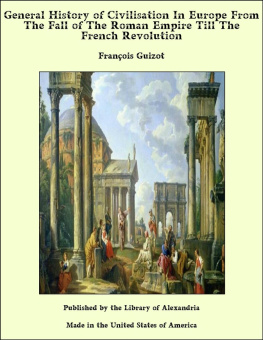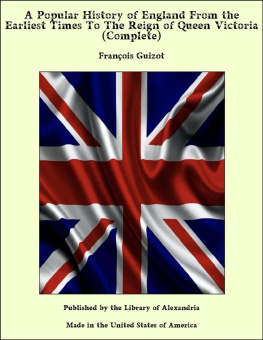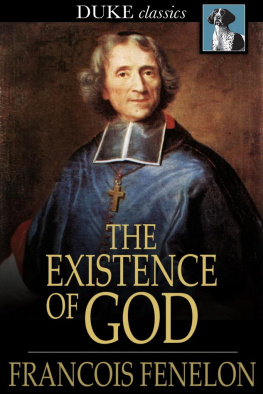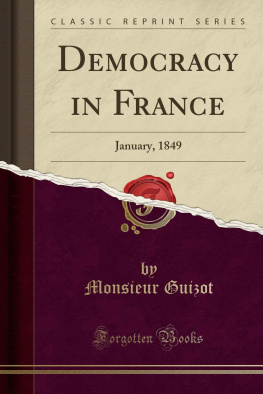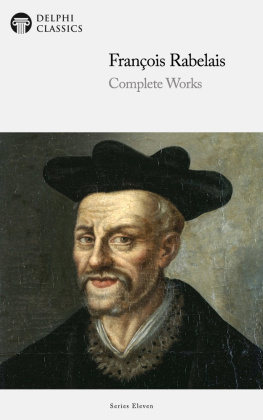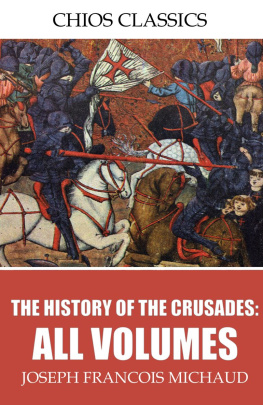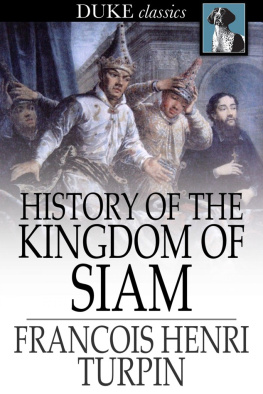CHAPTER XVII.
THE CRUSADES, THEIR DECLINE AND END.
In the month of August, 1099, the Crusade, to judge by appearances, had attained its object. Jerusalem was in the hands of the Christians, and they had set up in it a king, the most pious and most disinterested of the crusaders. Close to this ancient kingdom were growing up likewise, in the two chief cities of Syria and Mesopotamia, Antioch and Edessa, two Christian principalities, in the possession of two crusader-chiefs, Bohemond and Baldwin. A third Christian principality was on the point of getting founded at the foot of Libanus, at Tripolis, for the advantage of another crusader, Bertrand, eldest son of Count Raymond of Toulouse. The conquest of Syria and Palestine seemed accomplished, in the name of the faith, and by the armies of Christian Europe; and the conquerors calculated so surely upon their fixture that, during his reign, short as it was (for he was elected king July 23, 1099, and died July 18, 1100, aged only forty years), Godfrey de Bouillon caused to be drawn up and published, under the title of Assizes of Jerusalem, a code of laws, which transferred to Asia the customs and traditions of the feudal system, just as they existed in France at the moment of his departure for the Holy Land.
Forty-six years afterwards, in 1145, the Mussulmans, under the leadership of Zanghi, sultan of Aleppo and of Mossoul, had retaken Edessa. Forty-two years after that, in 1187, Saladin (Salah-el-Eddyn), sultan of Egypt and of Syria, had put an end to the Christian kingdom of Jerusalem; and only seven years later, in 1194, Richard Coeur de Lion, king of England, after the most heroic exploits in Palestine, on arriving in sight of Jerusalem, retreated in despair, covering his eyes with his shield, and saying that he was not worthy to look upon the city which he was not in a condition to conquer. When he re-embarked at St. Jean dAcre, casting a last glance and stretching out his arms towards the coast, he cried, Most Holy Land, I commend thee to the care of the Almighty; and may He grant me long life enough to return hither and deliver thee from the yoke of the infidels! A century had not yet rolled by since the triumph of the first crusaders, and the dominion they had acquired by conquest in the Holy Land had become, even in the eyes of their most valiant and most powerful successors, an impossibility.
Richards Farewell to the Holy Land10
Nevertheless, repeated efforts and glory, and even victories, were not then, and were not to be still later, unknown amongst the Christians in their struggle against the Mussulmans for the possession of the Holy Land. In the space of a hundred and seventy-one years from the coronation of Godfrey de Bouillon as king of Jerusalem, in 1099, to the death of St. Louis, wearing the cross before Tunis, in 1270, seven grand crusades were undertaken with the same design by the greatest sovereigns of Christian Europe; the Kings of France and England, the Emperors of Germany, the King of Denmark, and princes of Italy successively engaged therein. And they all failed. It were neither right nor desirable to make long pause over the recital of their attempts and their reverses, for it is the history of France, and not a general history of the crusades, which is here related; but it was in France, by the French people, and under French chiefs, that the crusades were begun; and it was with St. Louis, dying before Tunis beneath the banner of the cross, that they came to an end. They received in the history of Europe the glorious name of Gesta Dei per Francos (Gods works by French hands); and they have a right to keep, in the history of France, the place they really occupied.
During a reign of twenty-nine years, Louis VI., called the Fat, son of Philip I., did not trouble himself about the East or the crusades, at that time in all their fame and renown. Being rather a man of sense than an enthusiast in the cause either of piety or glory, he gave all his attention to the establishment of some order, justice, and royal authority in his as yet far from extensive kingdom. A tragic incident, however, gave the crusade chief place in the thoughts and life of his son, Louis VII., called the Young, who succeeded him in 1137. He got himself rashly embroiled, in 1142, in a quarrel with Pope Innocent II., on the subject of the election of the Archbishop of Bourges. The pope and the king had each a different candidate for the see. The king is a child, said the pope; he must get schooling, and be kept from learning bad habits.
Never, so long as I live, said the king, shall Peter de la Chatre (the popes candidate) enter the city of Bourges. The chapter of Bourges, thinking as the pope thought, elected Peter de la Chatre; and Theobald II., Count of Champagne, took sides for the archbishop elect. Mind your own business, said the king to him; your dominions are large enough to occupy you; and leave me to govern my own as I have a mind. Theobald persisted in backing the elect of pope and chapter. The pope excommunicated the king. The king declared war against the Count of Champagne; and went and besieged Vitry. Nearly all the town was built of wood, and the besiegers set fire to it. The besieged fled for refuge to a church, in which they were invested; and the fire reached the church, which was entirely consumed, together with the thirteen hundred inhabitants, men, women, and children, who had retreated thither. This disaster made a great stir. St. Bernard, Abbot of Clairvaux and the leading ecclesiastical authority of the age, took the part of Count Theobald. King Louis felt a lively sorrow, and sincere repentance. Soon afterwards it became known in the West that the affairs of the Christians were going ill in the East; that the town of Edessa had been re-taken by the Turks, and all its inhabitants massacred. The kingdom of Jerusalem, too, was in danger. Great was the emotion in Europe; and the cry of the crusade was heard once more. Louis the Young, to appease his troubled conscience, and to get reconciled with the pope, to say nothing of sympathy for the national movement, assembled the grandees, laic and ecclesiastical, of the kingdom, to deliberate upon the matter.
Deliberation was more prolonged, more frequently repeated, and more indecisive than it had been at the time of the first crusade. Three grand assemblies met, the first in 1145, at Bourges; the second in 1146, at Vezelai, in Nivernais; and the third in 1147, at Etampes; all three being called to investigate the expediency of a new crusade, and of the kings participation in the enterprise. Not only was the question seriously discussed, but extremely diverse opinions were expressed, both amongst the rank and file of these assemblies, and amongst their most illustrious members. There were two men whose talents and fame made them conspicuous above all; Suger, Abbot of St. Denis, the intimate and able adviser of the wise king, Louis the Fat, and St. Bernard, Abbot of Clairvaux, the most eloquent, most influential, and most piously disinterested amongst the Christians of his age. Though both were ecclesiastics, these two great men were, touching the second crusade, of opposite opinions. Let none suppose, says Sugers biographer and confidant, William, monk of St. Denis, that it was at his instance or by his counsel that the king undertook the voyage to the Holy Land. Although the success of it was other than had been expected, this prince was influenced only by pious wishes and zeal for the service of God. As for Suger, ever far-seeing and only too well able to read the future, not only did he not suggest to the monarch any such design, but he disapproved of it so soon as it was mentioned to him. The truth of it is, that, after having vainly striven to nip it in the bud, and being unable to put a check upon the kings zeal, he thought it wise, either for fear of wounding the kings piety, or of uselessly incurring the wrath of the partisans of the enterprise, to yield to the times. As for St. Bernard, at the first of the three assemblies, viz., at Bourges, whether it were that his mind was not yet made up or that he desired to cover himself with greater glory, he advised the king to undertake nothing without having previously consulted the Holy See; but when Pope Eugenius III., so far from hesitating, had warmly solicited the aid of the Christians against the infidels, St. Bernard, at the second assembly, viz., at Vezelai, gave free vent to his feelings and his eloquence. After having read the popes letters, If ye were told, said he, that an enemy had attacked your castles, your cities, and your lands, had ravished your wives and your daughters, and had profaned your temples, which of you would not fly to arms? Well, all those evils, and evils still greater, have come upon your brethren, upon the family of Christ, which is your own. Why tarry ye, then, to repair so many wrongs, to avenge so many insults? Christian warriors, He who gave His life for you to-day demandeth yours; illustrious knights, noble defenders of the cross, call to mind the example of your fathers, who conquered Jerusalem, and whose names are written in heaven! The living God hath charged me to tell unto you that He will punish those who shall not have defended Him against His enemies. Fly to arms, and let Christendom re-echo with the words of the prophet, Woe to him who dyeth not his sword with blood! At this fervent address the assembly rang with the shout of the first crusade, God willeth it! God willeth it! The king, kneeling before St. Bernard, received from his hands the cross; the queen, Eleanor of Aquitaine, assumed it, like her husband; nearly all the barons present followed their example; St. Bernard tore up his garments into crosses for distribution, and, on leaving the assembly, he scoured the country places, everywhere preaching and persuading the people. The villages and castles are deserted, he wrote to the pope; there is none to be seen save widows and orphans whose husbands and fathers are alive. Nor did he confine himself to France; he crossed into Germany, and preached the crusade all along the Rhine. The emperor, Conrad III., showed great hesitation; the empire was sorely troubled, he said, and had need of its head. Be of good cheer, replied St. Bernard so long as you defend His heritage, God himself will take the burden of defending yours. One day, in December, 1146, he was celebrating mass at Spire, in presence of the emperor and a great number of German princes. Suddenly he passed from the regular service to the subject of the crusade, and transported his audience to the last judgment, in the presence of all the nations of the earth summoned together, and Jesus Christ bearing his cross, and reproaching the emperor with ingratitude. Conrad was deeply moved, and interrupted the preacher by crying out, I know what I owe to Jesus Christ: and I swear to go whither it pleaseth Him to call me. The attraction became general; and Germany, like France, took up the cross.



